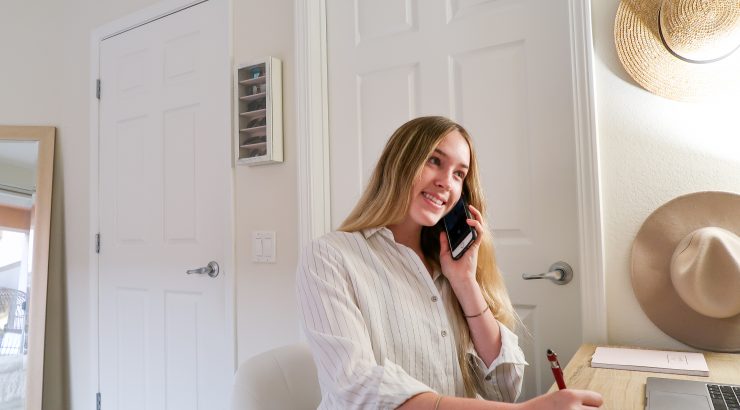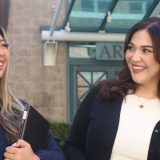
All You Need to Know About Informational Interviews What are they? What do you do? When do they happen?
April 2, 2021
As a Freshman this time last year, in April 2020, I had been conducting informational interviews almost every week. I was SO eager to get an internship in the summer that between January 2020 and May 2020, I had been messaging anyone and everyone that could teach me more about my industry and the companies that I was interested in. Of course, no one was expecting a pandemic to hit us within that time frame, which I thought had ruined all the work that I had put in. This was not at all true. In fact, all this work has benefited me in a way I was never expecting.
I had an interview last week with a company that I was reaching out to consistently throughout those few months in 2020, and one of the first things that the interviewer said was that they remembered me. I didn’t mention the informational interviews at all. They simply remembered my name and immediately I had made a connection. Reaching out to these companies just to get to know more about them has spread my name throughout the company and increased my chances of getting hired compared to those that didn’t.No, I didn’t get an internship that summer, but that wasn’t because I was doing informational interviews. That was mainly because we had just been hit by a pandemic and everyone was struggling with work. Fast forward a year later and 3 months into my current internship, I couldn’t be more grateful that I had conducted those informational interviews when I did.
Reminder! The goal of an informational interview is not to find or apply to job openings. It is a way to gain insight into an industry or learn what it’s like to work at a specific organization.
It’s no secret that informational interviews are beneficial. There is not one bad thing that could come from holding informational interviews with people in your industry (unless you were unprofessional in any way, which we know won’t happen because Panthers are awesome!). Today, I would love to help you stand out from the crowd and share with you my tips when it comes to having a successful informational interview!
What is an Informational Interview?
Informational interviews are not a typical step taken during the interview process, although you can make them part of your interview process. They are used to help future interviewees gain more knowledge on the company and/or the position they are applying to. They give the interviewee a chance to learn more about what they’re going to be involved in if they are offered the job. Informational interviews are also a great way to network and get your name known throughout the company!
When do I have Informational Interviews?
Informational interviews typically happen before and/or after you have applied somewhere, and before your actual job interview. If you don’t know if you have gotten an interview yet, then having a few informational interviews with some people from the company you are applying for is a great way to get your application noticed beforehand.
If you have yet to apply, holding informational interviews and reaching out to others in similar positions at the company is a GREAT way to get your name known within the company. More specifically with larger companies, if their applicant pool is in the hundreds or thousands, it is going to take a few extra steps to get your application thoroughly looked at by human eyes.
If you are confused by what I mean by “human eyes”, don’t forget to check out my recent blog on the Applicant Tracking System, otherwise known as the recruiter robot!
How to Ask for an Informational Interview
Most proposals for an informational interview will be sent in the form of an email or online message. It is important to remain clear and concise with these messages. If you are feeling confused or unsure what to include, we have curated a list of some topics you should have within your message:
- Introduce yourself
- Explain how you found them and what prompted you to reach out to them *SPECIFICALLY*
- Explain why you’re reaching out
- Directly ask for their help
- Thank them for their consideration
What do I do in an Informational Interview?
Informational interviews are a network and research opportunity for you. With this in mind, informational interviews can be conducted through any medium whether that be through LinkedIn messages, email, Zoom, Google Meet, or over the phone.
Informational interviews are a chance for you to ask questions. The questions will be more about the other person’s current and/or previous roles as well as the company culture. Essentially, YOU are the interviewer.
It doesn’t need to last any more than 15 minutes. Remember, the person you are communicating with is helping you out of the kindness of their own hearts. It is not a requirement in their job description so make sure you are being conscious of time!
Sample Questions to ask During your Informational Interview
Before you begin your informational interview, it is important to think of at least 3 questions you plan to ask them. Just like before a real interview, you want to go in prepared with questions. If you think of questions to ask during the informational interview, go ahead and ask those! It is never a bad idea to get more information about a topic that is brought up.
Below, I have included a few questions I have asked during my informational interviews as well as a few others you could ask (don’t forget to come up with some that are more specific to your industry):
- What are the most vital steps someone should take to prepare for a role like yours?
- Did you have any professional experiences unrelated to this industry that allowed you to excel in your current position?
- What were your main responsibilities in your previous job that has helped you in the role you are currently in?
- What is the company’s position on [XYZ]?
- What skills do you think are most important to bring into this position?
- What is it like working for your company?
- Can you describe the company culture?
- What are the most effective strategies for acquiring a job in this field?
- What do you like most about this company? What do you like the least?
- Can you suggest anyone else I could contact for additional information?
Covid-19 Related Questions:
- How have your responsibilities shifted within your role since you started working from home?
- Do you find yourself completing tasks for other departments that you wouldn’t have otherwise done before Covid-19?
- How has working from home benefitted your capability of completing required tasks? Any challenges?
What NOT to do in an Informational Interview
- Do not ask for a job: You are there to network and learn for your own benefit. Asking for a job might give them the wrong idea.
- Do not dress casually: You must treat this opportunity like an actual interview. This person could be a great connection to help advance your application and you want to make a good first impression. Be sure to dress professionally and treat this opportunity like a real interview.
- Fail to prepare: Just like a real interview, it is so important to make sure you come in prepared. Whether that’s with questions and/or a topic you want to bring up, make sure you are ready for the day. You don’t want to come off as if you are wasting their time. Prepare in advance and blow them away!
After Your Informational Interview
Thank You Notes
Don’t forget to thank them for their time, just like a real interview! It is important to remember that they are there to help for your benefit, not theirs. They have gone out of their way to assist you. Thank them for doing so and offering you their time! You may do so through a LinkedIn message, email, or with a physical card (if you have their contact information). Try not to do so through a text or phone call, even if you personally know the person. We want to practice professionalism whenever we can to better prepare us for the official interview. Why not start now?
While informational interviews are not mandatory, they are effective networking and research tools to gain firsthand knowledge about a particular industry, discover a variety of career paths, and learn what it’s like to work at a specific organization. Even if you’re not applying somewhere, having informational interviews could help you practice making clear statements and talking to someone in an authoritative position (which can be a bit intimidating your first few times). Try scheduling a few informational interviews before your next interview and see how much more prepared you feel!
If you enjoyed reading this, be sure to check out Kelly’s informative article, Myth vs Fact: Interviews.

